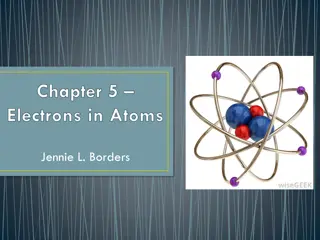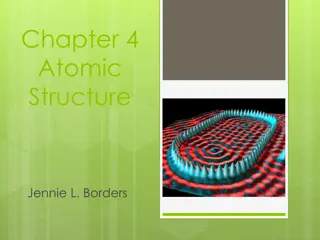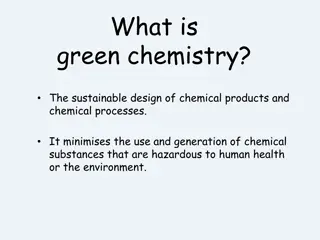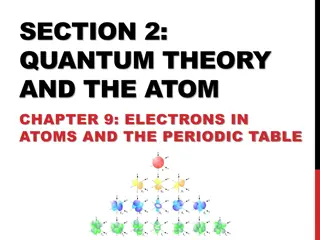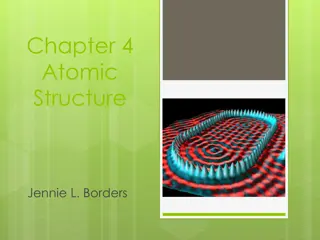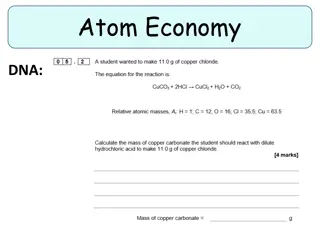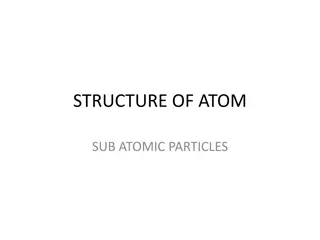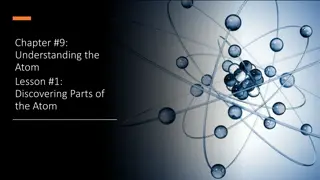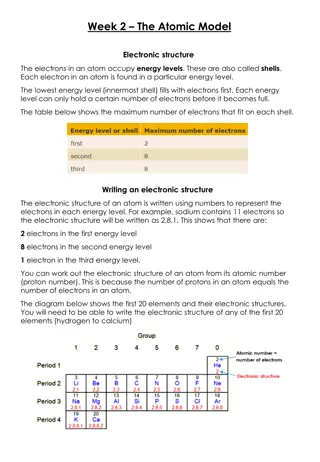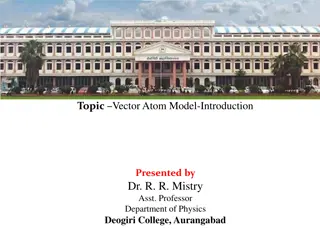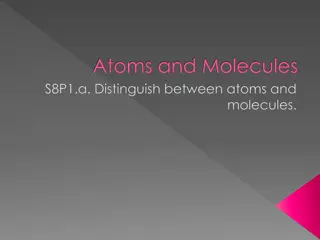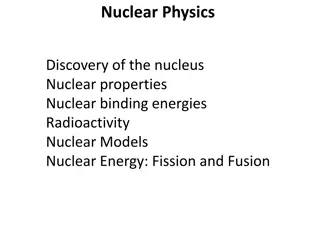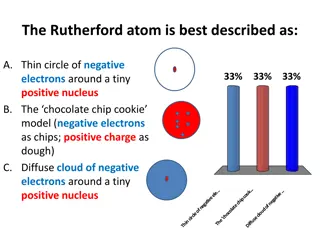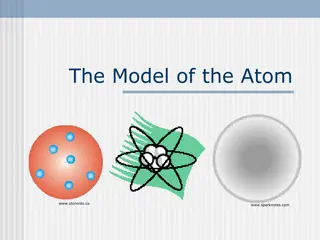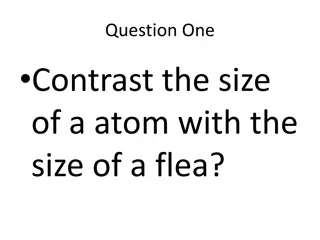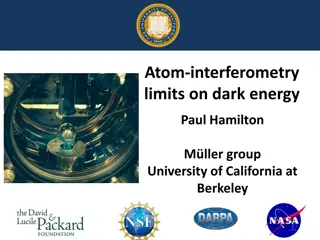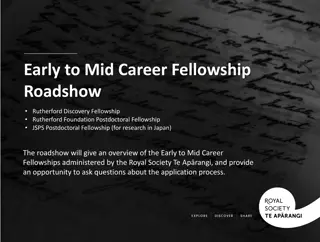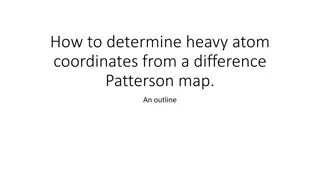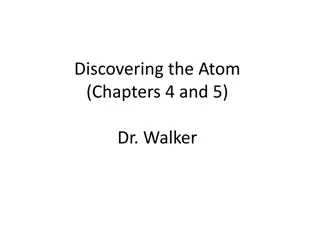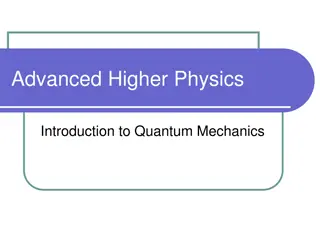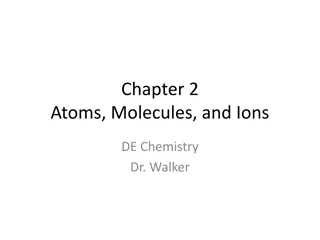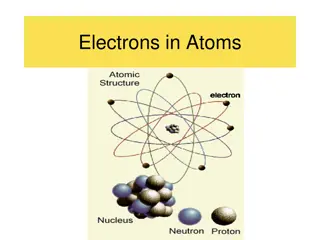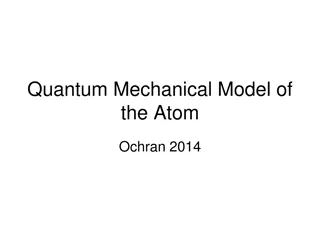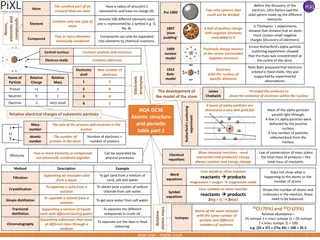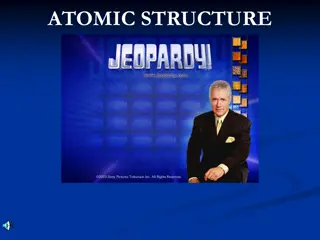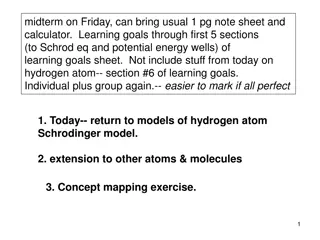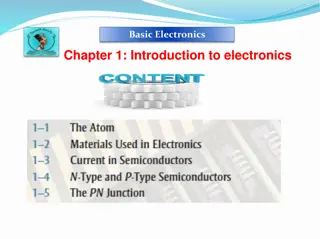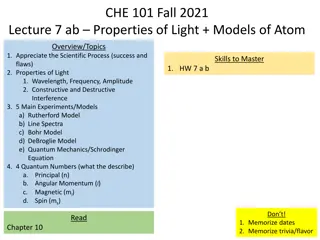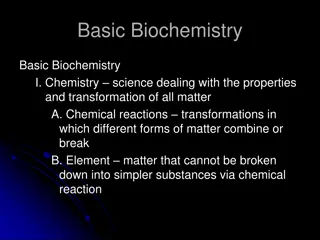Understanding Models of the Atom: Nucleus, Protons, Electrons
Dive into the fundamental concepts of atoms, exploring their structure with a focus on the nucleus, protons, electrons, and neutrons. Discover how the periodic table reveals crucial information about elements, such as atomic number and mass number. Explore the evolution of atom models and the necess
3 views • 20 slides
Acupuncture for Fertility Enhancing Reproductive Health with Kerry Rutherford Acupuncture
Experience the transformative power of acupuncture for fertility with Kerry Rutherford Acupuncture. Our specialised treatments focus on enhancing reproductive health, offering a holistic approach to support your fertility journey. Through the gentle insertion of fine needles at strategic points, we
11 views • 8 slides
Understanding Electrons in Atoms: Models and Quantum Mechanics
Explore the evolution of atom models from Rutherford to Bohr and the Quantum Mechanical Model. Learn about energy levels, electron movement, excitations, and orbital probabilities. Discover how electrons jump between energy levels and the limitations of Bohr's model in multi-electron atoms.
1 views • 51 slides
Unveiling the Journey of Atomic Structure Evolution
Delve into the historical perspectives and key theories that shaped our understanding of atomic structure. From Democritus' concept of indivisible atoms to Dalton's atomic theory and Thomson's discoveries on electric charges, this journey explores the evolution of atomic theory through the insights
0 views • 35 slides
Understanding Green Chemistry Principles and Efficiency in Chemical Processes
Green chemistry focuses on designing sustainable chemical products and processes to minimize hazardous substances. It advocates for waste prevention, efficient reactions, and use of raw materials. Chemical engineers play a key role in optimizing percentage yield and atom economy for efficient produc
0 views • 49 slides
Exploring Quantum Theory and the Atom: Electrons in Atoms and the Periodic Table
Delve into the fascinating world of quantum theory and the atom in Chapter 9, where we compare Bohr's model with the quantum mechanical model. Understand de Broglie's wave-particle duality and Heisenberg's uncertainty principle's impact on our current electron view. Discover the relationships among
0 views • 31 slides
Overview of Atomic Structure Theories and Discoveries
Exploring the evolution of atomic structure theories, from Democritus' concept of indivisible atoms to Dalton's theory of elements and compounds. Discoveries by Rutherford and Thomson furthered our understanding of particles and electric charges within atoms.
1 views • 36 slides
Understanding Atom Economy in Chemical Reactions
Explore the concept of atom economy in chemistry, learn how to calculate atom economy of a reaction, and understand why it is important for industrial processes. Watch a video, answer questions, and practice with worked examples and self-assessment tasks to grasp the significance of efficient indust
0 views • 21 slides
Exploring the Nature of Subatomic Particles and Light
Explore the intricate world of subatomic particles such as electrons, protons, and neutrons, and delve into the dual nature of light as both particles and waves. Discover the structure of atoms, their isotopes, atomic number, mass number, and the fundamental discoveries in the field of physics, incl
1 views • 16 slides
Exploring Parts of the Atom: A Visual Journey
Delve into the discovery of the constituents of an atom, from the negatively charged particles in the electron cloud to the positively charged particles in the nucleus. Learn about protons, neutrons, and the particle with no charge as they form the building blocks of matter. Engage with visually sti
4 views • 17 slides
Understanding Basic Electrical Concepts
Delve into the fundamentals of electricity, covering atom structure, electrical materials, direct and alternating currents, and more. Gain insights into key terms and definitions essential for basic circuit analysis. Explore the significance of atom charges, materials conductivity, and the role of p
0 views • 21 slides
Understanding Atomic Structure: Electrons, Energy Levels, and Historical Models
The atomic model describes how electrons occupy energy levels or shells in an atom. These energy levels have specific capacities for electrons. The electronic structure of an atom is represented by numbers indicating electron distribution. Over time, scientists have developed atomic models based on
0 views • 5 slides
Exploring the Vector Atom Model in Quantum Physics
Delve into the Vector Atom Model as presented by Dr. R. R. Mistry, discussing the quantum numbers, coupling, exclusion principles, and effects like Zeeman and Stark. Learn how this model explains complex atomic spectra and spatial quantization, offering a deeper understanding of atomic structures.
0 views • 11 slides
Understanding Atoms and Molecules: Basics and Models
Explore the world of atoms and molecules with a focus on distinguishing between them, understanding atomic structures through historic models like Bohr and Rutherford, and the modern atomic model. Discover how atoms form the basis of all matter and how they are organized within molecules.
0 views • 20 slides
Unveiling the Fascinating World of Nuclear Physics
Delve into the discovery of the nucleus, nuclear properties, binding energies, radioactivity, and nuclear models. Explore nuclear energy through fission and fusion, uncovering the intricate structure of the atom and Coulomb's law. Witness Rutherford's groundbreaking experiments that revolutionized o
0 views • 14 slides
The Rutherford Atom and Its Structure
The Rutherford atom is characterized by a thin circle of negative electrons surrounding a tiny positive nucleus. In this model, the electrons are in a diffuse cloud around the nucleus, forming the majority of the atomic volume but only a small fraction of the mass. Protons define an element's atomic
0 views • 17 slides
Evolution of Atomic Models: From Thomson to Bohr
Scientists from J.J. Thomson to Niels Bohr made groundbreaking discoveries in understanding the structure of the atom. Thomson's plum-pudding model was followed by Rutherford's nuclear model, revealing the nucleus. Bohr introduced the concept of discrete energy levels and orbits for electrons. These
4 views • 22 slides
Exploring Atom Structure and Properties Questions
This series of questions delves into the intriguing world of atoms, covering topics such as atom size comparison, proton count identification, location of metals on the Periodic Table, nucleus charge explanation, atomic number significance, various arrangements of the Periodic Table, subatomic parti
0 views • 12 slides
Enhancing Active Lifestyles in Rutherford County: 2018 Grant Recipients
Various organizations in Rutherford County have been awarded grants to improve outdoor facilities and programs promoting physical activity and community engagement. Projects include trail renovations, disc golf course construction, staff support for outdoor activities, scholarships for summer camps,
1 views • 54 slides
Enhancing Community Well-being Through Active Living Initiatives
Honoring our 2019 grant recipients, we support projects promoting active lifestyles. Initiatives include programs like Camp Harmony for students with disabilities, Chase High School's athletic recovery center, and the development of the Rocky Broad Riverwalk by Chimney Rock Village. Other supported
0 views • 50 slides
Limits on Dark Energy Using Atom Interferometry - UC Berkeley Study
Research conducted by Paul Hamilton Müller's group at the University of California, Berkeley, focuses on using atom interferometry to explore dark energy. The study delves into screened scalar fields as dark energy, future reach with atom interferometry, known unknowns related to dark energy densit
0 views • 39 slides
Challenges of Democracy and Corruption in the Gilded Age
The Gilded Age (1877-1900) was a time of political inaction and widespread corruption, raising doubts about the endurance of democracy in the face of powerful corporations and wealthy individuals. The era saw a balance of power with partisan divides making lawmaking difficult. Presidents like Ruther
0 views • 11 slides
Rutherford High School Curriculum Overview
Rutherford High School offers a comprehensive curriculum ranging from English to Mathematics. The curriculum night provides an overview of courses offered, course selection process, and graduation requirements. Students must complete four years of English and Mathematics, including specific assessme
0 views • 37 slides
Journey Through Atomic Models: From Thomson's Plum Pudding to Rutherford's Gold Foil Experiment
Explore the evolution of atomic models starting with J.J. Thomson's Plum Pudding Model in 1897, where the discovery of electrons led to the belief of a positive "glue." Follow the progression to Ernest Rutherford's Gold Foil Experiment in 1910, challenging the Plum Pudding Model and unveiling the nu
0 views • 27 slides
Opportunities at the Royal Society Te Apārangi for Early to Mid-Career Researchers
The Royal Society Te Apārangi offers various fellowships and support schemes for emerging and mid-career researchers in New Zealand, including the Rutherford Discovery Fellowship, Rutherford Foundation Trust, and JSPS Postdoctoral Fellowship. These opportunities aim to foster excellence in science,
0 views • 41 slides
Atom Probe Sample Request Details and Instructions
This detailed guide provides instructions and recommendations for submitting a sample request for atom probe analysis. It includes information on how to describe the sample, provide images, and outline the goals of the analysis. By following these guidelines, customers can facilitate discussions wit
0 views • 5 slides
Deciphering Heavy Atom Coordinates from Difference Patterson Map: An Overview
Understanding how to determine heavy atom coordinates from a difference Patterson map involves recognizing the relationship between Patterson peak coordinates (u,v,w) and space group symmetry operators in crystallography. By solving equations that relate these coordinates, the absolute positions of
0 views • 5 slides
Evolution of Atomic Theory: From Democritus to Thomson
Examine the evolution of atomic theory through the contributions of key scientists such as Democritus, Dalton, and Thomson. Explore the concept of subatomic particles, different models of the atom, and the impact of experiments on our understanding of the atom over time. From the solid sphere model
0 views • 33 slides
Evolution of Atomic Models: From Ancient Philosophers to Quantum Mechanics
Tracing the evolution of atomic models from the ancient Greek philosophers' concept of indivisible atoms to the groundbreaking discoveries of electrons, protons, and neutrons. The journey through Thomson's Plum Pudding model, Rutherford's planetary model, Bohr's quantized model, and the introduction
0 views • 14 slides
Chapter 2. Atoms, Molecules, and Ions
Explore the historical timeline of atomic theory advancements, from Demokritos' initial concept of "atomos" to Dalton's Atomic Theory, Thomson's discovery of the electron, and modern breakthroughs by scientists like Rutherford and Lawrence. Avogadro's contributions to the mole concept and gas laws a
0 views • 46 slides
Evolution of Atomic Models: From Dalton to Bohr
Explore the progression of atomic models from John Dalton's theory of tiny, structureless particles to J.J. Thomson's Plum Pudding model, Ernest Rutherford's discovery of the nucleus, and finally Niels Bohr's model with fixed electron orbits and energy levels. Witness the journey of scientific under
0 views • 28 slides
Evolution of Atomic Models: From Rutherford to Quantum Mechanics
Various atomic models have been proposed throughout history, starting with John Dalton's idea of atoms as tiny particles to J.J. Thomson's Plum Pudding model. Ernest Rutherford's discovery of the nucleus and Niels Bohr's quantum model of the atom revolutionized our understanding. Bohr's proposal of
0 views • 38 slides
Development of the Atomic Model: From Dalton to Rutherford
Before the discovery of the electron, John Dalton proposed the solid sphere model for elements, while JJ Thomson's experiments led to the discovery of electrons. Ernest Rutherford's alpha particle scattering experiment revealed the concentrated mass at the nucleus, which formed the basis of the nucl
0 views • 4 slides
Atomic Discoveries: Unveiling the Secrets of the Microcosm
Explore the realm of atomic structure and key discoveries through experiments such as the cathode ray tube, Milliken's oil drop experiment, and Rutherford's gold foil experiment. Delve into the world of electrons, isotopes, and quantum theory as you uncover the fundamental building blocks of matter
0 views • 55 slides
Quantum Chemistry Learning Goals and Concepts
This content covers the learning goals and concepts of quantum chemistry leading up to the Schrodinger equation and potential energy wells, excluding the material on the hydrogen atom introduced later. It explores models of the atom, including observations of atomic spectra, the Bohr model, de Brogl
0 views • 22 slides
Factors Affecting Acid Strength: Atoms, Size, Hybridization, and Electronegativity
The strength of acids is influenced by various factors such as the atom on which the negative charge of the acid's conjugate base rests, atom size, hybridization, and electronegativity. The stability of negative charges on atoms, atom size allowing charge delocalization, preferred orbital types for
0 views • 23 slides
Understanding the Basics of Atom Structure in Electronics
Learn about the fundamental concepts of atom structure in electronics, including the components of atoms, the Bohr model, electron orbits, energy levels, valence electrons, and more. Understanding these principles is essential for grasping the underlying mechanisms of electronic devices.
0 views • 18 slides
Exploring Properties of Light and Models of the Atom in Chemistry
Delve into the fascinating world of light properties and atom models in chemistry. Unravel the scientific process, from successes to flaws, and master concepts like wavelength, frequency, and amplitude. Explore key experiments and models such as the Rutherford, Bohr, and DeBroglie models, as well as
0 views • 24 slides
Understanding Basic Biochemistry: Matter, Elements, and Atom Structure
Basic Biochemistry explores the science of matter, chemical reactions, elements, and atom structure. It covers the properties and transformations of matter, the significance of essential elements for life, and the structure of atoms including protons, neutrons, and electrons. This foundational knowl
0 views • 50 slides
Unveiling Rutherford's Atom: A Journey into Subatomic Dimensions
Delve into the groundbreaking experiments of Rutherford's gold foil apparatus and the Gold Leaf Experiment, revealing the structure of atoms with subatomic particles like protons, neutrons, and electrons. Explore the dimensions of the electron cloud and nucleus through vivid chemical metaphors, prov
0 views • 24 slides


